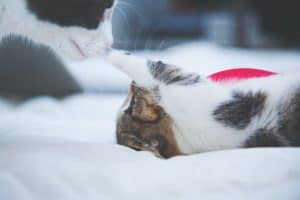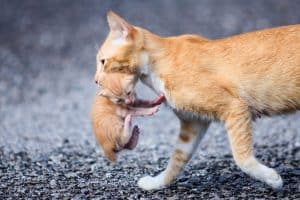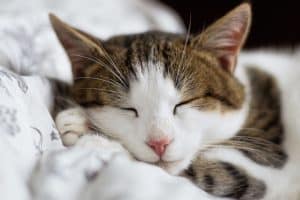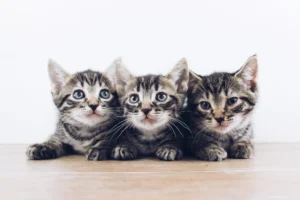Cats are known for their mysterious and quirky behaviors, and one common habit that many cat owners have observed is their tendency to chew on blankets. But why do cats do this? Let’s find out.
Cats chew on blankets for a variety of reasons, including teething, comfort, boredom, or even a form of play. Understanding why your feline friend engages in this behavior can help you better care for and bond with them.
Teething Phase: Why do cats chew on blankets when they are young?
When kittens are young, they go through a teething phase much like human babies. During this time, their gums can be sore and tender, causing discomfort. Chewing on blankets or other soft items might help alleviate this discomfort as it provides a gentle pressure on their gums.
As a pet owner, it’s important to provide your kitten with appropriate chew toys to redirect this behavior and protect your blankets. Make sure to offer toys specifically designed for teething to fulfill their need to chew. Additionally, keep an eye on your kitten and distract them if they start chewing on your blankets.
It’s crucial to understand that blanket chewing during the teething phase is normal behavior for kittens. By providing them with suitable alternatives, you can help manage this behavior and prevent damage to your belongings.
Comfort and Security: Do cats chew on blankets for emotional reasons?
While kittens may chew on blankets during their teething phase, adult cats may do so for emotional reasons, seeking comfort and security. Blankets can provide a sense of warmth and familiarity, especially in stressful situations.
If your cat is chewing on blankets for emotional reasons, it may indicate that they are feeling anxious or seeking comfort. Creating a calm and secure environment for your cat can help reduce their need to chew on blankets. Providing them with a cozy bed or a designated comfort spot can fulfill their need for security.
In some cases, blanket chewing can also be a form of self-soothing for cats. If you notice this behavior, try to identify the underlying cause of their stress and address it accordingly. Engaging your cat in playtime and providing interactive toys can also help alleviate anxiety and reduce the urge to chew on blankets.
Additional Insight: Kittens may also chew on blankets to explore different textures and tastes as part of their curiosity. Providing a variety of safe textures for them to explore can help satisfy this natural drive and prevent them from chewing on blankets excessively.
Boredom Buster: Can blanket chewing be a sign of boredom in cats?
Cats, just like us, can get bored. When cats feel understimulated, they may resort to interesting behaviors like chewing on blankets. This activity can provide them with some entertainment and physical stimulation. To prevent this behavior, try engaging your cat with interactive toys, puzzle feeders, or rotating their toy selection regularly. Providing perches near windows for bird watching or setting up a cat tree can also help keep your feline friend entertained. Remember, a happy cat is less likely to seek out unusual habits like blanket chewing.
Dental Health: Is blanket chewing beneficial for a cat’s teeth?
While blanket chewing may seem innocent, it’s essential to consider its impact on your cat’s dental health. Chewing on blankets does not provide the same benefits as chewing specifically designed dental treats or toys. In fact, it may even pose risks such as ingesting fibers or threads that could lead to gastrointestinal issues. To promote good dental hygiene, offer your cat dental treats or toys designed to improve oral health. Regular veterinary check-ups are crucial for monitoring your cat’s dental condition and ensuring they have a clean bill of health.
Additional Unique Insight:
Cats have a natural instinct to chew on objects due to their predatory nature. Chewing helps keep their jaw muscles strong and their teeth clean in the wild. While blanket chewing may not directly contribute to dental health, providing safe chew toys can satisfy your cat’s natural inclination to gnaw. Look for toys designed for chewing and supervision during playtime to ensure your cat stays safe and entertained.
Playful Behavior: How can blanket chewing be a form of play for cats?
Cats may chew on blankets as a form of playful behavior, similar to how they would play with toys or chase after prey. For cats, the texture of the blanket might feel interesting or satisfying in their mouths, leading them to chew on it. To redirect this playful energy, provide alternative toys such as interactive puzzles, feather wands, or catnip-filled toys. Engaging your cat in interactive play sessions can help satisfy their hunting instincts and keep them mentally stimulated. Remember, cats are natural hunters, so providing them with toys that mimic this behavior can be a great outlet for their energy.
Anxiety and Stress: Can blanket chewing indicate emotional distress in cats?
Excessive blanket chewing in cats could be a sign of underlying anxiety or stress. Cats may engage in this behavior to self-soothe or cope with their emotions. To create a calm and comforting environment for your cat, make sure they have a quiet space to retreat to when they feel overwhelmed. Providing hiding spots, vertical spaces to climb, and comforting scents like lavender can help reduce stress. Additionally, consider incorporating interactive playtime, regular feeding schedules, and consistent routines to help alleviate anxiety in your feline friend.
Additional Unique Insight:
Aromatherapy can be a useful tool in reducing stress for cats. Diffusing calming essential oils like lavender or chamomile in their environment can have a soothing effect on their emotions. Just make sure to use pet-safe oils and consult with your veterinarian before introducing any new scents to your cat’s space.
Training Techniques: How can you discourage blanket chewing in cats?
If your furry friend has developed a habit of munching on blankets, fret not! There are practical strategies to steer them away from this behavior. First and foremost, positive reinforcement is key. Whenever you catch your cat chewing on something other than a blanket, offer a tasty treat or some extra attention to reinforce the good behavior.
Another tactic is to provide appropriate chew toys for your cat. Keep these toys readily available and encourage your cat to chew on them instead of the blankets. This redirects their chewing behavior in a positive way, sparing your cozy blankets from potential damage.
Consistency is crucial when implementing these training techniques. With patience and positive reinforcement, your cat can learn to leave your blankets alone and opt for more suitable items to chew on.
Medical Concerns: When should you seek veterinary advice for blanket chewing behavior?
While blanket chewing may seem harmless, it can sometimes indicate an underlying medical issue in your feline friend. If you notice excessive chewing on blankets accompanied by other concerning symptoms such as vomiting, diarrhea, lethargy, or changes in appetite, it’s crucial to seek veterinary advice promptly.
Dental problems or nutritional deficiencies could be potential reasons behind this behavior. A visit to the vet is necessary to rule out any health issues and ensure your cat receives the appropriate care and treatment if needed.
Remember, your cat’s well-being is a top priority. If blanket chewing becomes excessive or is accompanied by other worrisome signs, don’t hesitate to consult with your veterinarian to address any potential underlying health concerns promptly.
Fun Facts: Interesting tidbits about cats and their chewing habits
Did you know that cats have a natural instinct to chew on soft materials like blankets? This behavior is often linked to their soothing and comfort-seeking nature. While it may seem odd to us, it’s a common way for cats to alleviate stress or anxiety.
Another fascinating fact is that cats have specialized teeth designed for tearing and shredding food. When they chew on blankets, it could be a way for them to exercise these teeth and keep them healthy. So, next time you catch your feline friend nibbling on your favorite throw, know that they might just be taking care of their dental hygiene in their own unique way!
One interesting insight is that chewing on blankets can also be a sign of boredom in cats. Just like how we might fidget or bite our nails when we’re restless, cats may turn to chewing as a way to pass the time and entertain themselves. Providing plenty of toys and interactive playtime can help redirect this behavior towards more appropriate outlets.
Bonus Tip: To discourage your cat from chewing on blankets, offer them alternative chewing toys or treats specifically designed for feline dental health. This can help redirect their chewing instincts while keeping them entertained and satisfied.
Alex, a passionate animal lover, has experience in training and understanding animal behavior. As a proud pet parent to two dogs and three cats, he founded AnimalReport.net to share insights from animal experts and expand his knowledge of the animal kingdom.









